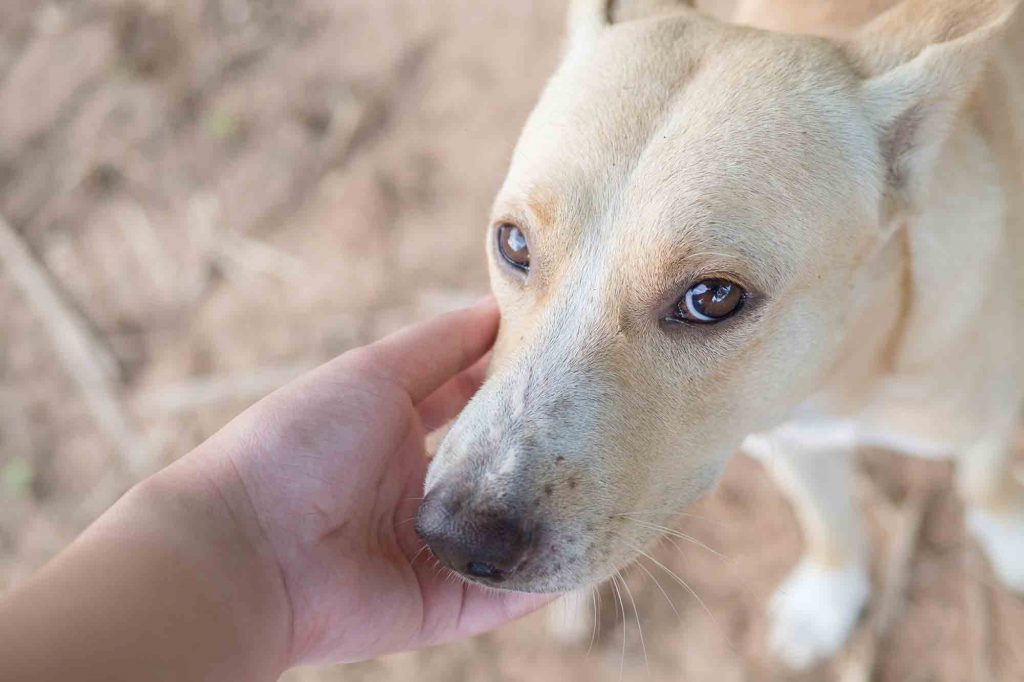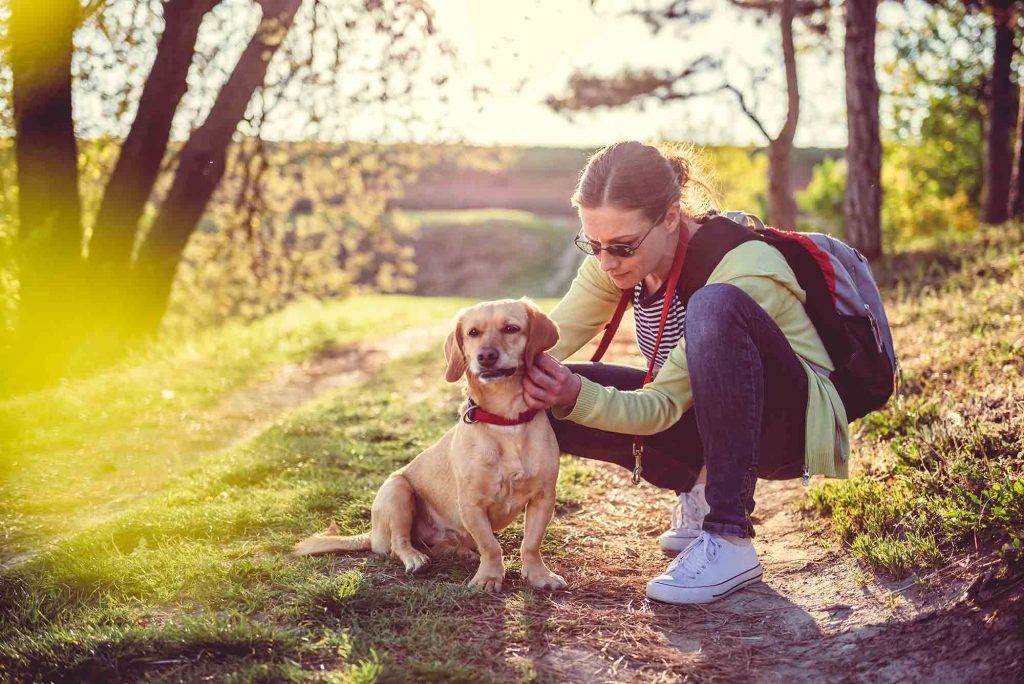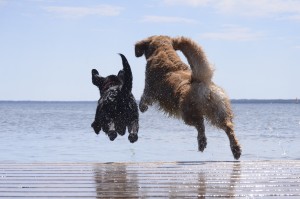Posts in Category: Pet Safety
Pet Cancer: A Primer
 Hearing that your pet has cancer is a frightening experience, but according to the National Canine Cancer Foundation, 1 out of 3 dogs will receive a diagnosis of cancer in their lifetime. For cats, the statistic is 1 out of every 5 according to the Animal Cancer Foundation.
Hearing that your pet has cancer is a frightening experience, but according to the National Canine Cancer Foundation, 1 out of 3 dogs will receive a diagnosis of cancer in their lifetime. For cats, the statistic is 1 out of every 5 according to the Animal Cancer Foundation.
There is good news, however. Some pet cancers are treatable, especially if caught early and treated aggressively. There’s also ongoing research for the development of new treatments, as well as cures for some forms of cancer. At Volunteer Veterinary Hospital, we honor Cancer Awareness Month by exploring common forms of pet cancer and some possible treatment options.
Preventing Lyme Disease in Dogs
 Ticks are known to cause many problems, not the least of which is Lyme disease. Caused by the bacterium Borrelia burgdorferi, Lyme disease is transmitted by the bite of a tick and affects dogs and humans alike. You may be wondering which dogs are at risk, and how do we treat and prevent Lyme disease in dogs. Stay tuned for a primer from your veterinary team at Volunteer Veterinary Hospital.
Ticks are known to cause many problems, not the least of which is Lyme disease. Caused by the bacterium Borrelia burgdorferi, Lyme disease is transmitted by the bite of a tick and affects dogs and humans alike. You may be wondering which dogs are at risk, and how do we treat and prevent Lyme disease in dogs. Stay tuned for a primer from your veterinary team at Volunteer Veterinary Hospital.
Packing on the Pounds: Pet Obesity
 A fluffy pet is super cute, but what about a fat one? Despite the adorable images of roly poly cats and dogs, there really is nothing cute about an overweight pet.
A fluffy pet is super cute, but what about a fat one? Despite the adorable images of roly poly cats and dogs, there really is nothing cute about an overweight pet.
Pet obesity is a huge factor in the health and quality of life of our animal friends. At Volunteer Veterinary Hospital, helping your pet maintain a healthy weight is a top goal.
Diabetes in Pets 101
 It is Pet Diabetes Awareness Month, and what better time to take a minute to learn about this common affliction in both our dog and cat family members? Join Volunteer Veterinary Hospital as we explain everything you need to know about diabetes in pets.
It is Pet Diabetes Awareness Month, and what better time to take a minute to learn about this common affliction in both our dog and cat family members? Join Volunteer Veterinary Hospital as we explain everything you need to know about diabetes in pets.
Diabetes in a Nutshell
Diabetes is one of the most common diseases in the human population in this country, so most of our pet parents have some concept of what this disease is and how it can affect the body. Many people are shocked to find out, though, that our pets can develop this disease, too.
The Howl-O-Ween Blog: All About Pet Halloween Safety
 The leaves are changing, the air has cooled, and is tinged with the smell of wood smoke. Everywhere you turn there are carved pumpkins on the porches, spooky cobwebs in the trees, and bags of candy disappearing off the store shelves. There’s no doubt about it, Halloween is right around the corner.
The leaves are changing, the air has cooled, and is tinged with the smell of wood smoke. Everywhere you turn there are carved pumpkins on the porches, spooky cobwebs in the trees, and bags of candy disappearing off the store shelves. There’s no doubt about it, Halloween is right around the corner.
While you and your family are getting ready for a night of costumed fun, Halloween festivities can have some serious consequences for our pets. Not only does your pet potentially have access to more toxic foods this time of year, his or her risk of injury increases as well. Help keep your pet happy, calm, and safe this year with our Halloween pet safety tips. Continue…
My Dog Ate My Homework! Foreign Bodies in Pets
 In the digital day and age, the timeless excuse that the dog ate your homework may not be as relevant as it once was. That doesn’t stop us, however, from seeing a wide variety of items that pets have ingested.
In the digital day and age, the timeless excuse that the dog ate your homework may not be as relevant as it once was. That doesn’t stop us, however, from seeing a wide variety of items that pets have ingested.
Foreign bodies in pets can be serious business, but if Fido or Felix eats something he shouldn’t have, a trusted veterinarian near you is ready to help.
You Are What You Eat
All too often our pets ingest things they shouldn’t. This may be due to curiosity, boredom, or even carelessness. While some items are actually toxic or can cause a secondary illness like pancreatitis, others pose a physical risk. Even inert objects can become stuck or lodged in the digestive tract, wreaking havoc on your pet’s insides. Continue…
Pet Care: Flat-Nosed Dogs and Summer Heat
 While we love their adorable, squishy faces, brachycephalic breeds (or brachys) have physical limitations that come with their unique features.
While we love their adorable, squishy faces, brachycephalic breeds (or brachys) have physical limitations that come with their unique features.
Flat-nosed dogs include breeds such as pugs, bulldogs, boxers, and King Cavalier Spaniels. Although cute, these animals are more susceptible to heat-related conditions due to structural challenges that affect breathing and panting. As a result, owners of flat-nosed dogs should take extra care when heading outdoors in hot, humid weather.
Flat Nose, Short Muzzle: The Health Risks
Hundreds of years ago, humans began selectively breeding dogs (and cats) to produce specific, beneficial traits. Consequently, some genetic mutations occurred more rapidly than they would have naturally, leading to the emergence of certain physical conditions. In brachycephalic pets, this process has impacted their ability to breathe. Continue…
Pet Wellness: What You Need to Know About Pets and Water Safety
 Every species has an appreciation for water, mostly because we all depend on this powerful element for survival. Water recreation is also the go-to option for family fun this summer; it’s even more enjoyable with your splash-loving dog. To help ensure a rip-roaring good time, we’ve compiled the latest pet wellness tips and water safety.
Every species has an appreciation for water, mostly because we all depend on this powerful element for survival. Water recreation is also the go-to option for family fun this summer; it’s even more enjoyable with your splash-loving dog. To help ensure a rip-roaring good time, we’ve compiled the latest pet wellness tips and water safety.
Are You Prepared?
Early exposure to water play is recommended. Try gradually increasing swim time and depth once your pet displays confidence and ability.
A fitted personal flotation device is quite possibly the single most important item your pet needs this summer. Without a high-quality life jacket, your pet could be at risk of drowning – even if you consider him or her to be a strong swimmer. Continue…
Traveling with a Pet: Coping with Car Anxiety
 Bringing a beloved pet along on a fun summer outing, vacation, or keeping an important veterinary appointment can present many challenges. For some, car rides are the BEST EVER(!). Trips like these can cause anxiety and stress, especially in cats.
Bringing a beloved pet along on a fun summer outing, vacation, or keeping an important veterinary appointment can present many challenges. For some, car rides are the BEST EVER(!). Trips like these can cause anxiety and stress, especially in cats.
Since car travel is a part of most pets’ lives, addressing issues of intense fear, phobia, or anxiety can help lessen the stress both for pet and pet owner while traveling with a pet.
Wild Wind and Rain: Keeping Your Pet Safe In Severe Weather
 You may have already begun the household preparations for our tumultuous spring and summer storms, such as securing shingles on the roof, cutting back rotten tree limbs, and ensuring your shutters are ready to protect your windows. But there’s one more thing you have to do to get ready for hail storms, thunder, and tornadoes – and your pet will be grateful you did.
You may have already begun the household preparations for our tumultuous spring and summer storms, such as securing shingles on the roof, cutting back rotten tree limbs, and ensuring your shutters are ready to protect your windows. But there’s one more thing you have to do to get ready for hail storms, thunder, and tornadoes – and your pet will be grateful you did.
Wondering how you can keep your pet safe in severe weather? Volunteer Veterinary Hospital has your furry friend covered.
First Things First
It’s not uncommon for animals sensing danger to flee, and it’s best to bring your pet in as soon as you know a storm is on the way. Tornadoes, high winds, hail, and thunder often send a ripcurl of anxiety through many pets, causing them to bolt. Continue…

